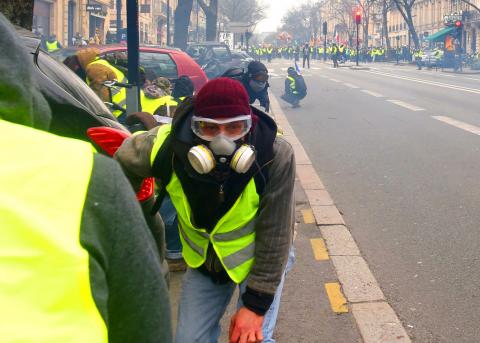French President Emmanuel Macron’s government is cracking down on executives who avoid paying taxes in France as part of efforts to quell “yellow vest” protesters.
The French government is scrutinizing the tax situation of business leaders and plans to take measures to force them to pay their taxes in France if necessary, French Minister of Public Action and Accounts Gerald Darmanin told Le Journal du Dimanche.
“Heads of listed businesses or businesses in which the state has a stake must absolutely be French tax residents,” Darmanin said.

Photo: AFP
The increased tax scrutiny is Macron’s latest effort to rope in businesses to respond to the protesters’ anger over inequality and the high cost of living. Alongside tax cuts for low-income households, Macron has also urged companies to pay special year-end bonuses to rank-and-file employees.
The government has resisted demands from many protesters to reinstate the wealth tax, which Macron abolished when he became president.
Darmanin said efforts to make executives pay tax in France should encourage more “civic” behavior, but making all executives pay tax in the country would not be simple as it could require renegotiating tax conventions.
“It would take years and we aren’t necessarily in a position of force to impose our views,” wealth advisory firm Equance head Olivier Grenon-Andrieu told Le Journal du Dimanche.
There are signs that the “yellow vest” movement could be losing steam.
The seventh Saturday of protests in the capital drew only 800 people to “sporadic” gatherings, Paris police said.
Some protesters have said they would take to the streets again yesterday amid New Year’s Eve celebrations, when Macron is expected to deliver an address to the nation.
French police forces are deploying extra means to secure public spaces for the New Year’s celebrations.
Police are to establish a perimeter around the Champs-Elysees in Paris and take steps to secure retail centers, public spaces and transport networks, the French Ministry of the Interior said in a statement on Sunday.
Almost 148,000 police officers and soldiers were to be mobilized in France yesterday evening, it said.
As tax cuts for households come into effect this month, Macron has also promised a national debate on democracy and public spending. The government hopes this would calm the protests and rebuild trust in the country’s institutions.
“The president has called for a big debate, and that’s a very good thing,” Darmanin said.

On Tuesday, US President Donald Trump weighed in on a pressing national issue: The rebranding of a restaurant chain. Last week, Cracker Barrel, a Tennessee company whose nationwide locations lean heavily on a cozy, old-timey aesthetic — “rocking chairs on the porch, a warm fire in the hearth, peg games on the table” — announced it was updating its logo. Uncle Herschel, the man who once appeared next to the letters with a barrel, was gone. It sparked ire on the right, with Donald Trump Jr leading a charge against the rebranding: “WTF is wrong with Cracker Barrel?!” Later, Trump Sr weighed

HEADWINDS: Upfront investment is unavoidable in the merger, but cost savings would materialize over time, TS Financial Holding Co president Welch Lin said TS Financial Holding Co (台新新光金控) said it would take about two years before the benefits of its merger with Shin Kong Financial Holding Co (新光金控) become evident, as the group prioritizes the consolidation of its major subsidiaries. “The group’s priority is to complete the consolidation of different subsidiaries,” Welch Lin (林維俊), president of the nation’s fourth-largest financial conglomerate by assets, told reporters during its first earnings briefing since the merger took effect on July 24. The asset management units are scheduled to merge in November, followed by life insurance in January next year and securities operations in April, Lin said. Banking integration,

LOOPHOLES: The move is to end a break that was aiding foreign producers without any similar benefit for US manufacturers, the US Department of Commerce said US President Donald Trump’s administration would make it harder for Samsung Electronics Co and SK Hynix Inc to ship critical equipment to their chipmaking operations in China, dealing a potential blow to the companies’ production in the world’s largest semiconductor market. The US Department of Commerce in a notice published on Friday said that it was revoking waivers for Samsung and SK Hynix to use US technologies in their Chinese operations. The companies had been operating in China under regulations that allow them to import chipmaking equipment without applying for a new license each time. The move would revise what is known

Artificial intelligence (AI) chip designer Cambricon Technologies Corp (寒武紀科技) plunged almost 9 percent after warning investors about a doubling in its share price over just a month, a record gain that helped fuel a US$1 trillion Chinese market rally. Cambricon triggered the selloff with a Thursday filing in which it dispelled talk about nonexistent products in the pipeline, reminded investors it labors under US sanctions, and stressed the difficulties of ascending the technology ladder. The Shanghai-listed company’s stock dived by the most since April in early yesterday trading, while the market stood largely unchanged. The litany of warnings underscores growing scrutiny of